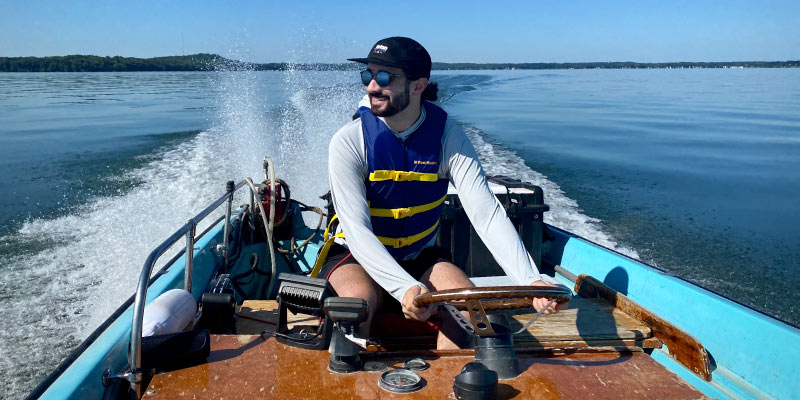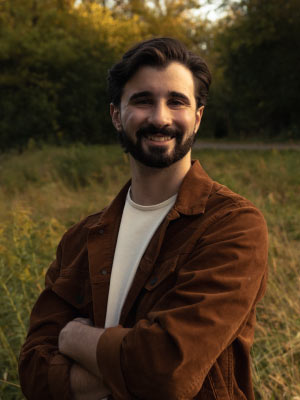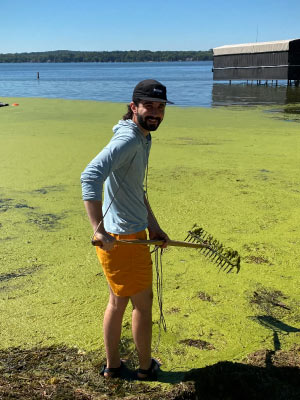
As a recent runner-up for the Center for Climatic Research’s Reid Bryson Scholarship poster session, undergraduate senior Sean Bertalot never expected such a distinction just a few short years ago.
Originally from Madison, Bertalot decided to stick to his roots and attend UW–Madison where he began as a pre-business student. After taking a general course load his freshman year, he soon found himself being drawn toward environmental sciences and officially majored in it his sophomore year, adding on the environmental studies certificate as well.
This change of plans wasn’t something Bertalot anticipated. He never did poorly in any of his high school science classes, but never excelled in any, either. Ultimately, Bertalot never thought he would be able to make a career within environmental science.
“Then, through a lot of the courses I took here, I started to get the understanding that this is actually something I can do as a career,” Bertalot said. “And once that realization started, I was set on pursuing an environmental studies/sciences path.”

Bertalot appreciates how complementary the environmental sciences major is with the environmental studies certificate, citing how there is a nice mix of hard science with interdisciplinary focuses. “I found that picking up environmental studies and taking more courses within the Nelson Institute gave me a little more flexibility to explore different angles of environmental issues,” Bertalot said. “It’s added another dimension to what I was already studying.”
For Bertalot, two classes within his environmental studies certificate stood out to him in terms of offering different perspectives to his hard science classes: Environment in the Global Economy with Associate Professor Dominic Parker, and Environmental Policy and Regulation with instructor Morgan Robinson. “Those classes were amazing,” Bertalot said.
Bertalot also took Conservation of Aquatic Resources, which has turned into the focal point of his studies. He currently works as an undergraduate researcher at the Stanley Lab within the UW–Madison Center for Limnology, where he researches the remote sensing of algae blooms and spatial patterns on lakes.
With encouragement from his mentor, PhD student David Ortiz, along with head of the Stanley Lab and Center for Limnology professor, Emily Stanley, Bertalot conducted his own independent research when not working on job tasks; research that propelled him into entering the Reid Bryson Scholarship poster session.
As part of the Nelson Institute Center for Climatic Research, the 11th annual Reid Bryson Scholarship poster session was held February 13, 2023, as part of the Atmospheric, Oceanic, and Space Sciences Building Poster Reception. The event offers two undergraduate and five graduate scholarship awards with the hopes of capturing the interdisciplinary nature of Professor Reid Bryson’s studies and inspiring other UW–Madison students.
Bertalot’s poster — Cyanobacteria Blooms: Coupling Satellite Remote Sensing and High-Resolution Spatial Data — was a visual culmination of what he’s been researching. “It was an exceptional opportunity in all regards, but also just great to see what I’ve been working on for the past eight months, manifested into an actual product,” Bertalot said.
As runner-up for the undergraduate award, Bertalot said it was “an honor to be recognized for something I’ve been working on mostly by myself, but also with some really amazing support from a couple key mentors.”

Outside of his classes and research, Bertalot also works with Water Action Volunteers (WAV), a citizen science stream monitoring program within the UW–Madison Division of Extension. There, he assembles monitoring kits for Wisconsin streams that are sent to volunteers across the state who measure water flow, turbidity, and oxygen, among other things. Data is collected throughout the year and then returned to WAV, where Bertalot helps coordinate with the Wisconsin Department of Natural Resources to enter the information into a database.
“It feels a lot more personal than just a job,” Bertalot said. “It’s been a really cool organization to be a part of and having first-hand experience with a big community science initiative has been awesome.”
As Bertalot finishes his final semester in May, he’ll go on to the University of Wyoming to earn a master’s degree in zoology. There, he’ll be joining the Collins Lab, also known as the Aquatic Ecosystem Ecology Lab, headed by Assistant Professor Sarah Collins, who worked with Stanley years ago as a post-doctoral fellow. “It’ll be very similar stuff to what I’ve been doing at the Center for Limnology, but just in a different landscape,” Bertalot said. He’ll be contributing to the WY-ACT project which aims to better understand how climate change impacts Wyoming’s aquatic systems.
As he prepares to move out West, Bertalot reflects on his experiences at the Nelson Institute and Center for Limnology. “Not only was it a welcoming community, but I’ve never once felt talked down to, and I’ve always had my questions met with kind regard and thoughtfulness,” Bertalot said. “It sounds corny, but I’ve just not had a bad experience.”
This year’s Reid Bryson poster session saw a record 46 student applicants from a diverse set of departments and institutes across campus. Congratulations to all the winners!
2023 Reid Bryson Undergraduate Scholarships
Winner: Connor Steinke, “Volume Transport Changes through West Greenland Arctic Gateways in CMIP6 Models”
Runner-Up: Sean Bertalot, “Cyanobacteria Blooms: Coupling Satellite Remote Sensing and High-resolution Spatial Data”
2023 Reid Bryson Graduate Scholarships
Winner: Harrison Tran, “Reconstructing Oceanic Precipitation Trends using Ship-based Observations”
Runners-Up:
Ian Cornejo, “Mei-Yu Frontal Convergence and Heavy Rainfall in Taiwan’s Complex Terrain”
Aaron Alexander, Resolving Fine-Scale Lateral Water Transfers in Urban Environments alters Regional Climate Simulations”